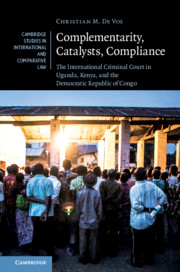 Complementarity, Catalysts, Compliance
Complementarity, Catalysts, Compliance Book contents
- Complementarity, Catalysts, Compliance
- Reviews
- Cambridge Studies in International and Comparative Law: 147
- Complementarity, Catalysts, Compliance
- Copyright page
- Dedication
- Contents
- Acknowledgements
- Table of Cases and Pleadings
- Table of Statutes and Statutory Instruments
- Abbreviations
- Preface
- 1 Introduction
- Part I The ICC and Complementarity: Evolutions, Interpretations and Implementation
- Part II The ICC in Uganda, Kenya and the Democratic Republic of Congo
- 5 Compliance and Performance
- 6 Competing, Complementing, Copying
- 7 Catalysing Opportunity
- 8 Conclusions and Recommendations
- Select Bibliography
- Index
- Cambridge Studies in International and Comparative Law: 147
6 - Competing, Complementing, Copying
Domestic Courts and Complementarity
from Part II - The ICC in Uganda, Kenya and the Democratic Republic of Congo
Published online by Cambridge University Press: 16 April 2020
- Complementarity, Catalysts, Compliance
- Reviews
- Cambridge Studies in International and Comparative Law: 147
- Complementarity, Catalysts, Compliance
- Copyright page
- Dedication
- Contents
- Acknowledgements
- Table of Cases and Pleadings
- Table of Statutes and Statutory Instruments
- Abbreviations
- Preface
- 1 Introduction
- Part I The ICC and Complementarity: Evolutions, Interpretations and Implementation
- Part II The ICC in Uganda, Kenya and the Democratic Republic of Congo
- 5 Compliance and Performance
- 6 Competing, Complementing, Copying
- 7 Catalysing Opportunity
- 8 Conclusions and Recommendations
- Select Bibliography
- Index
- Cambridge Studies in International and Comparative Law: 147
Summary
This chapter examines the emergence of specialized domestic courts as a frequently cited outcome of ICC interventions. It highlights the shifting, adaptive nature of complementarity as the basis for reforming domestic judicial systems, even though the link between these efforts and the ICC itself is often tenuous. The chapter highlights how, in contexts like Uganda and Kenya, the threat of the ICC’s jurisdiction was used to prompt the setting up of domestic legal bodies and to buttress putative admissibility challenges. By contrast, recent descriptions depict these bodies more literally as extensions of the ICC: Rather than displacing the court, they are meant to complement and ‘complete’ its work. Non-state actors in the Democratic Republic of Congo have invoked complementarity in a similar manner, even though the domestic proceedings there through military courts are not materially connected to - nor the direct result of - the ICC’s undertakings. In tracing these shifts, the chapter considers complementarity’s duelling impulse towards conformity (specialized domestic courts often mimic the ICC) and competition (such courts are often in tension with the ‘ordinary’ justice system). I also suggest the concept of a ‘justice meme’ to understand how the perceived need for conformity with ICC practice is transmitted and replicated.
- Type
- Chapter
- Information
- Complementarity, Catalysts, ComplianceThe International Criminal Court in Uganda, Kenya, and the Democratic Republic of Congo, pp. 193 - 237Publisher: Cambridge University PressPrint publication year: 2020


